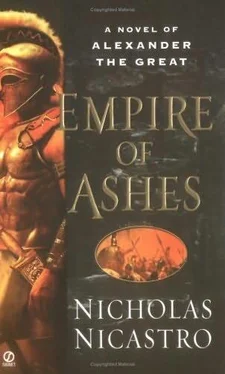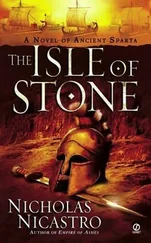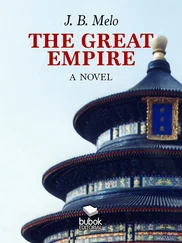Nicholas Nicastro - Empire of Ashes - A Novel of Alexander the Great
Здесь есть возможность читать онлайн «Nicholas Nicastro - Empire of Ashes - A Novel of Alexander the Great» весь текст электронной книги совершенно бесплатно (целиком полную версию без сокращений). В некоторых случаях можно слушать аудио, скачать через торрент в формате fb2 и присутствует краткое содержание. Жанр: Исторические приключения, на английском языке. Описание произведения, (предисловие) а так же отзывы посетителей доступны на портале библиотеки ЛибКат.
- Название:Empire of Ashes: A Novel of Alexander the Great
- Автор:
- Жанр:
- Год:неизвестен
- ISBN:нет данных
- Рейтинг книги:4 / 5. Голосов: 1
-
Избранное:Добавить в избранное
- Отзывы:
-
Ваша оценка:
- 80
- 1
- 2
- 3
- 4
- 5
Empire of Ashes: A Novel of Alexander the Great: краткое содержание, описание и аннотация
Предлагаем к чтению аннотацию, описание, краткое содержание или предисловие (зависит от того, что написал сам автор книги «Empire of Ashes: A Novel of Alexander the Great»). Если вы не нашли необходимую информацию о книге — напишите в комментариях, мы постараемся отыскать её.
Empire of Ashes: A Novel of Alexander the Great — читать онлайн бесплатно полную книгу (весь текст) целиком
Ниже представлен текст книги, разбитый по страницам. Система сохранения места последней прочитанной страницы, позволяет с удобством читать онлайн бесплатно книгу «Empire of Ashes: A Novel of Alexander the Great», без необходимости каждый раз заново искать на чём Вы остановились. Поставьте закладку, и сможете в любой момент перейти на страницу, на которой закончили чтение.
Интервал:
Закладка:
Aeschines’s portrait of Sisygambus is fair-perhaps it is the actor in him that affords him such a sensitive understanding of old women. But I fear he makes too much of Alexander’s gallant treatment of Stateira, Darius’s principal wife. I ask you, why should anyone be surprised at this? Of course Alexander protected the royal household-every soul in it was his property!
Alexander was usually abstemious in his dealings with women. Slanderers have misrepresented his gallantry as evidence of certain defects of character with respect to the pleasures taken by men with men. The presence of Hephaestion, his best companion, is offered as evidence of Alexander’s intemperance in this regard. Yet the very opposite might as well be argued, that the King kept but one true favorite through those long years. True, a man is expected to grow out of such affairs in the fullness of time. There are other attributes of seniority, such as a wife and children, that Alexander was likewise late in taking up, yet have never been the object of so much cheap gossip. By the gods, I will have many other matters on which to criticize him! On the flavor of his loves, though, I think a man like Alexander, who sacrificed more sensual pleasure than we will ever know for a short life spent in army camps, can be granted this single indulgence.
I did witness an incident that suggests that Stateira was not so virtuously treated after all. It was some time after the initial meeting. The King and his cronies were passing the evening in their usual positions-horizontal on the wine couch. This was still early in Alexander’s campaign to change the world, before the weight of events soured the wine. Don’t revolutions always start off that way, with everyone together in a merry band of brothers-until the sport starts? And doesn’t the sport always start?
It began this time when Craterus had the idea of inviting the most beautiful woman of Asia to their party. Alexander, having delivered himself into intoxication as fast as possible, agreed. The order went out, and the servants ran to retrieve her.
This call was made quite late at night-she was probably roused from her bed on this whim. As you might imagine, the woman imagined the worst, and contrived to stall. But this only gave the symposiasts time to get drunker still. Their anticipation heightened, they repeated the summons, this time more insistently.
Every pair of eyes paid her homage as she appeared at the tent flap. Stateira’s veil had been stripped away by the guard, revealing a face of such sublimity that the men were awed in the same way as they would be before eclipses, volcanoes or other wonders. Her skin was a sunny shade of golden untroubled by flaw; her hair was black and shining like the cloudless night that follows the day. She was clothed in a linen gown that revealed nothing except the shape of her limbs. This only seemed to magnify her appeal, as the Macedonians knew little of the nude female form, but instead liked to fill their houses with statues of half-draped nymphs and disheveled maenads.
If you have not seen a noble woman of Persia, you cannot know that there is a kind of doleful beauty that belongs solely to them. In all the countries I have travelled, I have never seen women look so good looking so wretched. Stateira’s only imperfection, I would say, was the fact of her perfection, which left her somewhat characterless. This did not seem to be the kind of woman any mortal could love.
For her part, Stateira was entirely impassive, looking at no one and taking no notice of her surroundings except to reach the couch next to Alexander. There she sat, as straight as an infantry pike, accepting no food or drink and saying nothing. The shape of her nostrils expressed resentment of the very air she breathed. There seemed an old woman’s share of desolation hidden behind her eyes.
The mood Stateira brought with her, the lure of both her beauty and her forlornness, reduced all the men around her to stupefaction. It was Cleitus who finally broke the silence, asking how any man could abandon such a prize, or even bring her so close to the battle that her loss could be contemplated.
“I must say I am disappointed,” replied Peithon, “for I expected her to be younger.”
“In her case it doesn’t matter.”
“Oh, it always matters with women! Here is the secret to escape becoming a slave to a pretty maid, boys: tell yourself that in five or ten years she’ll droop. It’s inevitable. It is the curse of the sex.”
“And boys don’t grow up? Men don’t droop?”
“Oh, who’s talking about men?”
With that, Peithon gave a glance at Alexander, and then to Hephaestion, who was unique in the group for his lack of enthusiasm for inviting Stateira, or for her presence. Cleitus had no such reticence, however:
“To me there’s no comparison. I’ve had it all, done it all from here to Kerkyra, and for my money it’s women.”
“Women have their uses,” countered Peithon, “but not for inspiring true desire. That cannot be denied.”
“I deny it-it is possible to have passion for females.”
Cleitus and Peithon went back and forth, debating the respective virtues of each sex until Perdiccas looked to the King. “And what does Alexander say of this?”
The King lowered his cup, smiled. “Diogenes recommended neither women nor boys, but masturbation. It’s like satisfying your hunger just by rubbing your stomach!”
During this exchange Stateira was there to look at, and as the looking was good, nothing more was demanded of her. But by the cracking of the fifth crater the men weren’t seeing so well, and some more lively form of entertainment seemed in order. Do you sing? they asked her. Dance? Recite the epic poems of your people? To each of these she gave a small toss of the head that we were given to understand meant “no.”
“Well then, what can you do?”
Craterus’s asked this question with the downward direction of his glance making clear his true meaning. The company, including Alexander but not Hephaestion, gave a laugh; Philotas, ever the jolly comrade, picked up the theme.
“But surely you play the flute? Don’t all women play the flute?”
More chortling, more drinks all around. And as the merriment rolled on, Stateira’s eyes began to moisten in the torchlight, until she hide her face behind her hands. Philotas slammed his cup to the table.
“Oh spare us this phony propriety, woman! Barbarian marriage isn’t like ours…you’re nothing but a fancy concubine.”
“You may count yourself lucky not be passed among the guards,” warned Cleitus.
Darius’s wife began to sob through her hennaed fingers, and with the first teardrop Alexander’s nobler instincts were aroused.
“Of course she plays the flute! That privilege, however, is for kings only. Now all of you, out!”
There was a moment of hesitation as everyone wondered if he was serious.
“OUT, I said!”
The celebrants rose as best they could, topping off their wine cups on the way. Hephaestion was in the lead until Alexander called him back.
“Not you my friend.”
“There is something I must attend. I…”
“Come here! Remember, you too are Alexander!”
Hephaestion obeyed, his face glowing red with rage and humiliation, as the rest of the party cheered and slapped him on the shoulder. From that moment it was clear to me just how unpopular Hephaestion was among his own people. His relationship with Alexander was so resented that it was a wonder that in all his battles he never ended up with a Macedonian arrow in his back. The last I saw was Hephaestion from behind, standing at awkward attention just inside the tent, as Stateira stared at him with fear rising in her eyes. The tent flap fell shut.
I am reminded here that Aristotle once told Alexander to be a leader to the Greeks, but a master to the barbarians. Of this particular incident Stateira, of course, divulged nothing. But when she died nearly two years later, it was not due to the rigors of living on the road, as Callisthenes has said. After all, the Persian court was always on the road! Instead, I have it on good authority that she died in childbirth. Of the fate of her baby I have nothing to report-not even Sisygambus knew, or if she did, she never divulged anything. So was Stateira’s honor respected? You be the judge.
Читать дальшеИнтервал:
Закладка:
Похожие книги на «Empire of Ashes: A Novel of Alexander the Great»
Представляем Вашему вниманию похожие книги на «Empire of Ashes: A Novel of Alexander the Great» списком для выбора. Мы отобрали схожую по названию и смыслу литературу в надежде предоставить читателям больше вариантов отыскать новые, интересные, ещё непрочитанные произведения.
Обсуждение, отзывы о книге «Empire of Ashes: A Novel of Alexander the Great» и просто собственные мнения читателей. Оставьте ваши комментарии, напишите, что Вы думаете о произведении, его смысле или главных героях. Укажите что конкретно понравилось, а что нет, и почему Вы так считаете.












